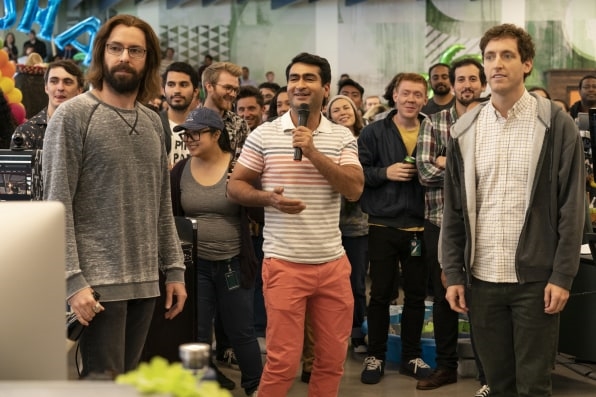HBO’s ‘Silicon Valley’ finally morphs into Surveillance Valley
The sixth and final season of HBO’s Silicon Valley debuts Sunday night, and the tension as old as the internet itself—between idealistic computer scientists and craven opportunists who can see how new technology can be weaponized toward a particular goal—is the theme running through the last chapter of the story of Pied Piper, the startup at the heart of the series. (The first three episodes were screened for critics.)
The season begins with Pied Piper’s CEO, Richard Hendricks, appearing before a Congressional hearing, an eerie bit of fortuitous timing given Facebook CEO Mark Zuckerberg’s testimony in front of the House Financial Services Committee just five days before the premiere. (I am pretty confident that Zuckerberg’s time on Capitol Hill was not a sponsored promotion for the show, but it is a rather telling example of how parody is harder than ever to pull off in 2019.) Hendricks gives a comedically fumbling but ultimately triumphant speech claiming that Amazon, Facebook, and Google won, and “we lost,” and how Pied Piper can restore us to a world of user sovereignty, delivering us an internet “of, by and for the people.”

This is the utopian vision we’ve been sold all along about the internet, but sure enough, during the triumphant welcome home party for Richard back at Pied Piper HQ, he discovers that his soaring rhetoric doesn’t match the reality of what’s happening at his company. It’s also not long before Richard himself uses Pied Piper’s ability to surveil its users to seek revenge on the developer who discovered that Pied Piper may, in fact, be “the greatest data collection platform in history.” As Richard says, “Data collection: Not so boss when it happens to you.”
The scene is rich with irony, but it’s more laughing-to-stop-from-crying funny than haha funny. Indeed, with every twist and turn, the main plot points of Silicon Valley are more like the beats of a harrowing verité documentary on the roots of surveillance capitalism than a situation comedy. Luckily, the show leavens this reality with a mix of outrageous set pieces (there is a scene depicting the crass commercialization of “sentiment analysis” technology that offers a cathartic payoff as we watch a game being rapidly polluted with ads and pop-ups) and the silly antics of the always reliable Zach Woods as the sycophantic Jared and Matt Ross’s blowhard mogul Gavin Belson.

Silicon Valley has always had fun with the tech world’s financier class, from season one’s cryptic Peter Gregory to the buffoonish Russ Hanneman, but it arguably tops itself with the addition of Maximo Reyes, as a young, charming Chilean investor whose family “executed people in soccer stadiums” but has now come to Silicon Valley to write billion-dollar checks and transform his family’s business from mining copper to mining data. His entrance into Richard’s world chillingly captures another part of the global web of moneyed interests who can’t unsee a technology’s potential for less than noble uses and how these conflicts play out. The show depicts a little too well how money perverts everything and ethics are for suckers with untenable business models.
It wasn’t long into the computer era that folks started to see the potential in using them to connect people. Dr. J. C. R. Licklider, one of the foundational figures in the development of what became the internet, established within the Advanced Research Projects Agency (ARPA) in the early 1960s a group of computer scientists he dubbed the “Intergalactic Network” to work on how to use computers to connect communities together. At the time, this was a radical idea. “The ARPA theme is that the promise offered by the computer as a communication medium between people, dwarfs into relative insignificance the historical beginnings of the computer as an arithmetic engine,” the agency concluded in a 1978 report.
Although ARPA and the internet itself was born out of research and not developed to advance U.S. military interests, ARPA was housed within the Department of Defense during the time of the civil rights movement and the Vietnam War. Soon after ARPAnet, the internet’s forerunner, was first deployed nationally, the CIA, the NSA, and the U.S. Army used it to surveil thousands of antiwar and civil rights activists.
There’s a growing library of books about the tech giants and the personal and societal effects of their data-collection practices. But if I had to offer a casual observer a primer into how talented engineers create technology without thinking about their consequences, how cunning investors corrupt founding ideals into mere marketing particularly in the recent era of mega fundraising rounds, and how all of these competing pressures warp our idyllic vision for the internet, the final season of Silicon Valley appears to be a good place to start.
(56)

